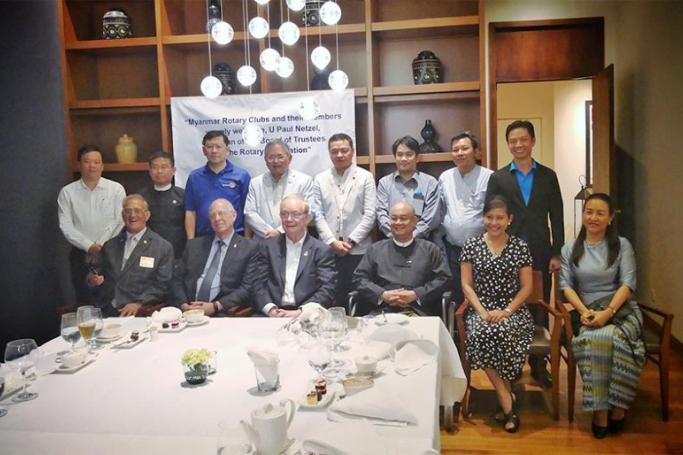On his second visit to Myanmar, Rotary Foundation Chair Paul Netzel spoke on Saturday at the Chatrium Hotel to express his hopes for what the country can accomplish through better engagement with Rotary International, a service organisation with a membership of 1.2 million spanning more than 200 countries.
As the organisation's second-highest ranking official, Netzel is concluding a trip around the world meeting with local clubs from Italy to Hong Kong before appearing before several dozen members of the Rotary Club of Yangon and Rotary Club of Central Yangon – currently the only chartered Rotary groups active in Myanmar.
“Just talking with the young people, what you are doing to role-model for them here in Myanmar, it will build a relationship throughout your great country, and it motivates Rotarians in other places,” Netzel said.
A previous iteration of the group in Myanmar, known as the Rangoon Club, was thrown out of the country by the ruling military junta in 1977. Following negotiations with the government facilitated by longtime-Rotarian J.T. Warring – who has been involved in Rotary-sponsored water management systems projects in Myanmar for more than a decade – the Rotary Club of Yangon became a chartered member in 2014.
In addition to speaking at a Yangon international school about getting young people involved in Rotary's Interact program, Netzel had the chance to meet with a deputy to the Minister of Health on Saturday morning to speak about challenges facing Myanmar – specifically its efforts to stay polio-free.
Although the minister himself was unable to attend, Netzel said the meeting was a productive one and hopes to see a national committee of Rotarians formed to work effectively with the government on critical public health issues.
“This is what's worked successfully in other countries, especially those that have had real challenges in the eradication process, to have a national advisory committee to meet with the health ministry's officials, WHO, UNICEF and so forth,” Netzel said.
Alongside its extensive engagement in areas like clean drinking water, access to education, humanitarian grants and micro-finance, the 101-year-old Rotary Foundation has played a pivotal role in global polio eradication.
With around 1,000 cases of crippling poliovirus infection recorded daily in 1988, many saw little hope for the goal of total eradication and the unprecedented vaccination effort that has grown to become the single largest internationally-coordinated public health initiative in history.
Currently driven by five core partners – Rotary International, WHO, CDC, UNICEF and the Bill and Melinda Gates Foundation – the Global Polio Eradication Initiative launched 30 years ago has helped to immunize more than 2.5 billion children and has resulted in a 99 percent drop in the number of infections worldwide.
While Myanmar was declared polio-free in 2007, the re-emergence of a rare strain of the virus in 2011 was a harsh reminder of the need to be constantly vigilant. In his speech, Netzel noted the ways that obstacles to mass immunization in the country as a result of long-running conflicts make greater cooperation imperative.
With Rotary International's proven track record helping to tackle massive public health issues, Netzel said that he hopes to one day see a network of Rotary clubs engaging with communities across Myanmar.
“He learned a lot about what we're doing as new clubs, and we also learned from him the greater things we can do in terms of lessons learned from other countries,” RCY president Sy Wann said. “It opened up many new possibilities and it gave us a lot more homework as well.”
When RCY assistant governor Martin Pun had a chance to take the stage, he congratulated Netzel on being a “Rotarian who attended a hundred percent for 50 consecutive years.”
You are viewing the old site.
Please update your bookmark to https://eng.mizzima.com.
Mizzima Weekly Magazine Issue...
14 December 2023
Spring Revolution Daily News f...
13 December 2023
New UK Burma sanctions welcome...
13 December 2023
Spring Revolution Daily News f...
12 December 2023
Spring Revolution Daily News f...
11 December 2023
Spring Revolution Daily News f...
08 December 2023
Spring Revolution Daily News f...
07 December 2023
Diaspora journalists increasin...
07 December 2023
Naungcho to be transformed into tourist destination












